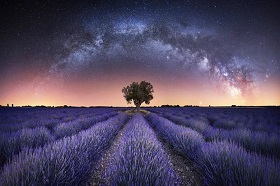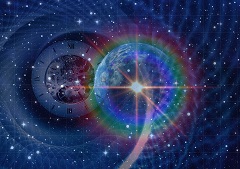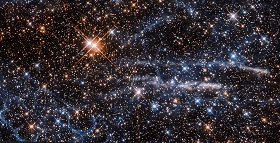Ramblings - First published October 2021

 Ramblings from David
Ramblings from David
October 2021
 ”When I admire the wonders of a sunset or the beauty of the moon, my soul expands in the worship of the creator.” Mahatma Gandhi
”When I admire the wonders of a sunset or the beauty of the moon, my soul expands in the worship of the creator.” Mahatma Gandhi
One area of the study of the cosmos, that is always astounding, are the distances and the time it takes for things to travel. Even light, as quick as it is, has in some cases taken billions of years, travelling through the vastness to reach us. It is amazing to think that a star whose starlight has taken say, 4 billion years to reach us, is radiant, and therefore would be travelling in the opposite direction equally vast distances. Just one star, reaching across the vastness of observable space amidst the company of trillions of others. On this note, here is an interesting thing to try if you want to get a sense of the vastness of space. Go out into a dark starlit night. Wait 20 minutes in the dark until your eyes are light adjusted. Stand looking up at the stars for a minute. Once you feel like you are taking in the panorama of the stars in the night sky, let yourself be reminded of the fact that you are stood on the planet and that there are just as many stars beneath you, as there are above you. Take a friend. Try this activity and then discuss between you if you felt something change in your mind. You might be quite surprised!

Time itself is very interesting. According to Einstein, if something travels at the speed of light, time stops. The understanding is that light that is observed from stars, billions of light years away, is as it was, all that time ago. That is because as far as the photons are concerned, time has stopped and they arrive in the astronomers telescope as they were when they were emitted. Cool… I hope that’s clear. What isn’t clear is the nature of that existence in that state where time has stopped.
If time stops, according to the science, it is assumed that nothing will change. The argument is that times arrow will cease to exist and so nothing happens. That however does not uphold the actuality of the journey of a photon. A photon first of all is travelling. It is moving through space. Also, despite time being stopped, if that photon finds its way to a telescope for example, it ceases to be. Or at least ceases to be in the way we understand it. If no time has happened for the photon, how does that balance with the fact that it has changed from the state it was into another. ie. Something, in its timeless existence, has changed without time happening.
If events are possible where no time has happened, what avenues in science and exploration will this open up. Consider this, for something for which time has stopped, does it mean to say it is stuck in that moment? Possibly… but maybe not. Does light that travels over billions of light years, cocooned in its timeless domain, arrive at its final destination in the same instant it left or has it existed in an eternity? Could it be both? Does the light beam experience both states simultaneously?

When time is talked about, it is usually the measures by which we have broken it down, that are used to describe it. One second, one minute, one hour etc. It is less frequently discussed as a coherent body, e.g. water is measured in quantities but it is also referred to and recognised as something that exists in nature. Due to the observable impact that speed for example, has upon time, time should be considered as a fabric that has a substance in nature; something with form that can be stretched pushed and pulled. More than just an arbitrary measure of man. If time stops for things travelling at light speed, where are the places it ticks fastest? Time ticks faster the further things travel away from gravitational forces. It has been proven that time ticks more quickly on spacecraft that are further away from the gravitational forces of earth. Also a clock that is standing still on earth, will tick faster than a clock that is moving.
The faster something moves, time ticks slower. The closer something is to gravitational forces, time ticks slower. For something that is stationary in outer space, time ticks more quickly. If there were places in deep space, that were not travelling at increasing speed like the galaxies are, time would be ticking at a much increased rate when compared to time on earth for example. If the stopwatch was started right now for the current moment for the entire Universe, time, if seen as a flexible sheet, would be flat. The next moment, the contours of time, would be seen to be developing troughs and peaks as some areas, relative to others, race into the future or fall into the past. With each moment the shape of time for the universe will evolve. Can time go backwards or is it just a new space of time; a universe maybe that will have its own vastness where the arrow of time will have as much meaning as the arrow of time does here? Would things travelling at light speed in that new space, experience the same halting of time, as observed in our time, or would there be a different impact. Maybe a big bang and something new?

Something new. One thing that has been observed about our Universe, is that it has structure and all looks pretty much the same, no matter which way you look. It is as though it is all part of the same thing. The same design. Imagine if we could see the time in the Universe. What energy is created by the stretching of time, and how does that energy increase with each evolving moment? Seeing the time contours in the universe, with their peaks, troughs and plains, creates a very different picture of the universe than the visible honeycomb pattern, that we can see with traditional imagery.
Asking questions about time, cosmological distance and light speed raises a further question; what is the point? Just simply enjoying the playfulness of ideas. The joy of asking questions and inquiry that sparks the imagination. Even the unanswered questions can open the doors to new ways of thinking.
If you are looking for a spark, try the exercise under the stars. Its simple, and may be enough to make your day different and one you’ll remember.
Previous ramblings can be found in the archive. For last months, click the link: September 2021 Ramblings




